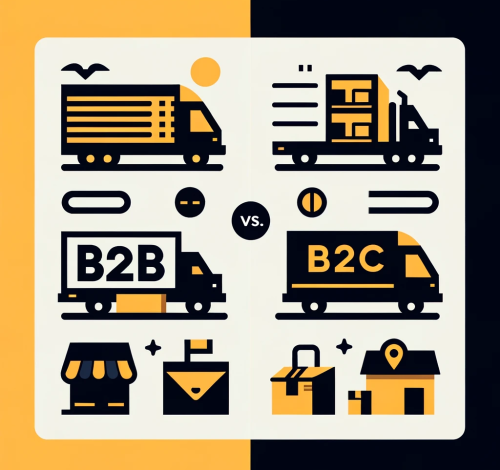Quick access
BtoB & BtoC Logistics

Introduction ⬇️
For an e-commerce business, distinguishing between a retail customer (BtoC) and a business customer (BtoB) is paramount. This difference is crucial at all levels, including from a logistical standpoint.
In an ever-evolving sector, understanding the general principles of logistics is not enough; it is also essential to grasp the distinctive nuances between BtoB and BtoC approaches. In this article, we will delve into the details of these two approaches, address hybrid business profiles, and examine how Futurlog and other logistics service providers juggle these nuances to offer tailored solutions to their clients.
BtoB Logistics 🏭
When it comes to BtoB transactions, businesses deal with each other. This often involves bulk orders, with high volumes but lower order frequencies. The priority is often accuracy and reliability in order fulfillment.
BtoB logistics requires careful planning to ensure product availability on time. The relationship between the supplier and the buyer is typically more formalized, with long-term contracts and specific service commitments.
BtoB logistics also emphasizes cost optimization, with companies striving to maximize their operational efficiency to retain competitiveness in the market. This may involve the use of advanced technologies such as Warehouse Management Systems (WMS) and inventory tracking solutions to minimize errors and delays.
BtoC Logistics 🏠
On the other hand, BtoC involves direct delivery of products to end consumers. Orders are typically smaller but more frequent, with increasingly complex expectations in terms of delivery times and service customization. Here, order fulfillment is generally simpler as it is less regulated.
BtoC logistics presents a unique set of challenges. Consumer expectations are high, with demands for fast and flexible deliveries. Companies must be prepared to handle a high volume of small orders, which often vary based on customer preferences and delivery addresses.
Hybrid Brands 🧬
It is also important to mention hybrid companies, which operate in both BtoB and BtoC sectors. These companies must juggle the often conflicting requirements of both markets, finding a balance between operational efficiency and customer satisfaction. This may require flexible logistics strategies and agile inventory management to meet the fluctuating demands of both market segments.
In this context, logistics partners like Futurlog play a crucial role by offering tailored solutions that address the specific needs of BtoB and BtoC clients. Their expertise in managing variable goods flows and their ability to adapt to changing market requirements make them valuable partners for e-commerce companies seeking to optimize their supply chain.
Conclusion ⬇️
In conclusion, the difference between BtoB and BtoC logistics lies in the nature of transactions, order volumes, and customer expectations. Understanding these nuances is essential for designing effective logistics strategies and providing quality service to customers. Logistics service providers play a crucial role in helping businesses navigate this complex landscape and providing solutions tailored to their specific needs.
Recognizing this complexity, Futurlog is proud to offer to its e-commerce partners logistics solutions that adapt to all types of businesses while maintaining an optimal level of quality. With Futurlog, whether you operate in BtoB, BtoC, or both, your logistics operations are guarenteed! Feel free to explore our various offers.
Discover how Futurlog can transform your logistics by clicking the link below 🔗
 Feel free to share:
Feel free to share: 
